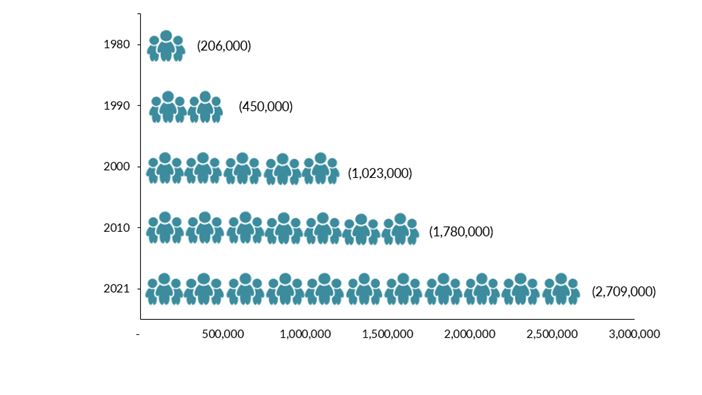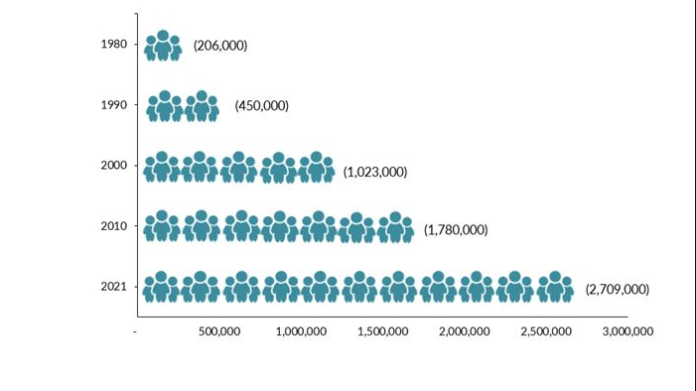
Sources: Data from U.S. Census Bureau 2010 and 2021 American Community Surveys (ACS), and Campbell J. Gibson and Kay Jung, “Historical Census Statistics on the Foreign-Born Population of the United States: 1850-2000” (Working Paper no. 81, U.S. Census Bureau, Washington, DC, February 2006), available online.
While the foreign press consistently talks about the Jewish-American and Israeli influence over America, going unnoticed is the burgeoning impact of India and migrant Indian-Americans on US politics and businesses. Eventually this could have a bigger impact both here and abroad. Let us just look at some simple data.
Indians have the highest Median Household Income among all ethnic groups in the United States. Census data of 2018 estimated the number at $119,858, almost $25,000 more than the second place Taiwanese at $95,737. Indian Americans make up only 1.5 percent of the population, but they pay about 6% of all income taxes. If you review the list of Fortune 100 companies, the following are headed by people of Indian-origin CEOs- Microsoft (Satya Nadella), Alphabet/Google (Sundar Pichai), IBM (Shantanu Narayen), Starbucks (Arvind Krishna), Novartis (Laxman Narashimhan), Micron Technology (Reshma Kewalramani) and Emerson Electric (Lal Karsanbhai).
The political influence of Indian-origin Americans is also expanding. Current members in the House include – Ro Khanna (California), Pramila Jaypal (Washington – also Chair of Congressional Progressive Caucus), Shri Thanedar (Michigan), Ami Bera (California) and Raja Krishnamoorthi (Illinois -Ranking Member on House Committee on Chinese Communist Party).
Beyond Congress, now, the most high-profile Indian/African American is, none other but Vice President Kamala Harris. As the Democratic Party Presidential nominee, she has a good probability of defeating Donald Trump and become the first woman President in US history.
In the Republican Party, the most high-profile Indian has been former South Carolina Governor Nicki Haley, but the newest star could be Usha Chilkuri, wife of Trump’s running mate Senator JD Vance. Usha Chilkuri Vance is a Yale educated lawyer as is her husband. Former Congressional Representative from Hawaii Tulsi Gabbard has been named to the Trump Transition Team and Vivek Ramaswamy is one of the rising stars in the Trump Republican Party.
An interesting side note – a few of the high profile expat Indian-American politicians have embraced the mainstream religions of this country: Kamala Harris – Baptist, Nicki Haley- non denominational Christian and former Governor of Louisiana Bobby Jindal – Catholic. Usha Chilkuri Vance, in contrast, is a practicing Hindu.
Out of the 940,000 active physicians in the US, Indian-origin physicians are almost 10%. In rural and inner-city hospitals, they constitute the majority among the medical staff. There still exists a gap between the number of graduates coming from US medical schools and actual need. Foreign medical graduates fill these deficits. For years now, India has been providing the largest number of International Medical Graduates to the US.
In other areas of healthcare, the data shows a similar trend. For instance, one out of five pharmacists working in the US is of Asian origin. Indians are the majority among the Asian-origin pharmacists. All three leading US pharmacy organizations – American Association of Colleges of Pharmacy (AACP), American Society of Health-System Pharmacists (ASHP) and American Pharmacists Association (APhA) – are currently headed by Presidents from Indian-origin.
One key element of maintaining economic dominance is investment in R & D (research and development). Indian scientists and engineers along with others from South East Asian countries including China constitute almost 40% of such professionals in the US. With relationship between US and China changing and worsening, Indian-origins scientists are likely to dominate this sector. Such a trend is clear in the universities in the US – multidisciplinary science, and engineering research centers like Argonne as well as giant pharmaceutical and technology companies are expat Indian owned/patronaged. Indian American researchers are also significant players in leading companies like Microsoft, Apple, Merck, and Pfizer.
While the loyalty of the expat Indian Americans is beyond reproach, their commitment to help their country of origin is also commendable. The robust IT sector in India could not have been achieved without the assistance of Motorola engineers like Satyanarayan (“Sam”) Pitrodha, who served as Technology Advisor to Prime Minister Rajiv Gandhi. Similarly, world class healthcare is available in India today because of huge contributions of Indian-origin doctors from around the world. Often cited examples include the Escort group of Heart hospitals and Medcity founded by former New York cardiovascular surgeon Dr. Naresh Trehan. Interestingly Indian hospitals currently contract with British National Health Service for specific services like cardiovascular surgery.
The influence of India within the US and the world is expected to increase as it carefully charts its path both as America’s chosen partner in countering the influence of China but its own pursuit to be a world power is also a dominant influencing factor in US and Expat Indian relationships. One significant example of India pursuing its own self-interest in direct conflict with that of the United States is the war in Ukraine. After China (50%), India (35%) is the biggest buyer of Russian crude oil and gas. This step is in violation of European Union’s full embargo on Russian oil and oil products. India is also Iran’s third biggest trading partner and is one of the largest foreign investors in Iran’s oil and gas industry.
Unlike England, India does not automatically support all foreign policy decisions of the United States, but they regularly have joint military exercises to coordinate potential threat from China.
At home the expat India-Americans are yet to significantly influence US foreign policy but that could change if Kamala Harris is elected as the President of the United States of America on November 5 this year.

